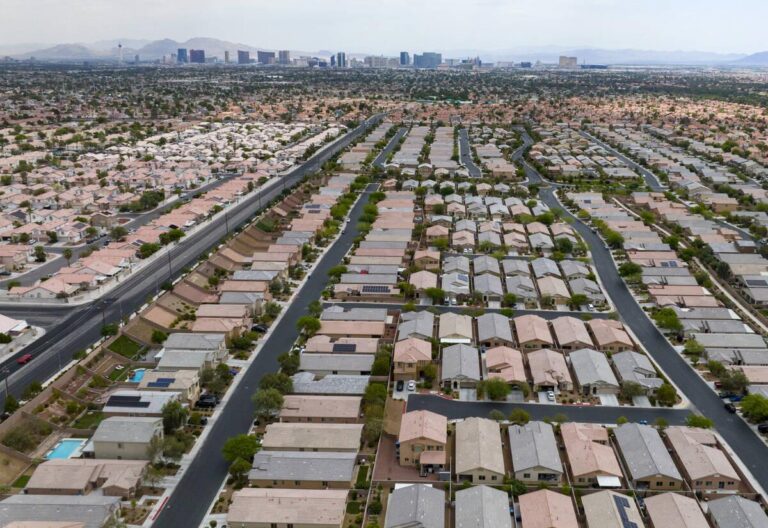Las Vegas Housing Affordability Declines More Rapidly Than National Average
Recent data indicates that Las Vegas is experiencing a more pronounced drop in housing affordability compared to the broader United States. While many metropolitan areas across the country have seen moderate increases in home prices balanced by wage growth, Las Vegas is witnessing home values climbing at a pace that far exceeds income gains. This imbalance is intensifying challenges for prospective buyers. Contributing factors include sustained demand fueled by population growth, a shortage of new housing developments, and heightened activity from real estate investors pushing prices upward.
Key statistics from the latest market analysis include:
- Median home prices in Las Vegas surged by 12% over the past year.
- Household income growth has been limited to approximately 3.5%.
- Housing inventory has contracted by 15%, exacerbating price pressures.
| Indicator | Las Vegas | National Average |
|---|---|---|
| Yearly Median Home Price Increase | 12% | 7.4% |
| Annual Income Growth | 3.5% | 4.2% |
| Change in Housing Inventory | -15% | -8% |
Financial Strain on Residents Amid Soaring Housing Expenses
Residents of Las Vegas, especially first-time homebuyers and renters, are confronting unprecedented financial hurdles as housing costs escalate beyond national trends. The rapid appreciation in home values, combined with rising mortgage interest rates nearing historic highs, has forced many to either stretch their budgets thin or delay homeownership plans indefinitely. Renters are also burdened as landlords pass on increased maintenance and property tax expenses, which are rising faster than the general inflation rate, directly impacting monthly rental payments.
Factors driving affordability challenges include:
- Median home prices increasing by over 10% annually
- Mortgage rates climbing approximately 1.5 percentage points in 2023
- Severely limited housing supply restricting buyer choices
- Property tax hikes reflecting growing municipal budget needs
| Factor | 2023 Change | Effect on Residents |
|---|---|---|
| Median Home Price | +12% | Higher upfront down payment requirements |
| Mortgage Interest Rates | +1.5% | Increased monthly mortgage costs |
| Rental Prices | +8% | Less disposable income for other expenses |
| Property Taxes | +6% | Greater ongoing homeownership costs |
Strategic Policy Recommendations to Mitigate Affordability Issues
Housing policy specialists stress the importance of implementing nuanced, targeted solutions to address the worsening affordability crisis in Las Vegas. They warn against generic,broad-based policies,advocating instead for approaches that prioritize vulnerable groups and specific segments of the housing market. Suggested strategies include expanding rental assistance programs, supporting affordable homeownership initiatives, and encouraging the development of mixed-income housing to foster inclusivity and balance market growth.
Proposed policy actions focus on:
- Targeted rental subsidies to help prevent displacement of long-term residents.
- Increased investment in community land trusts to maintain affordability over time.
- Zoning reforms that promote higher-density housing near public transit corridors.
- Strengthened tenant protections to provide stability amid rising housing costs.
These carefully designed measures aim to tackle systemic challenges while supporting lasting housing market dynamics.
Community Advocates Demand Expanded Affordable Housing Efforts
Local leaders and housing advocates are rallying to confront the escalating housing affordability crisis in Las Vegas, now ranked among the nation’s least affordable cities. The latest findings reveal that median rents and home prices have surged beyond income growth, pushing many households toward financial instability. Advocates warn that without significant investment in affordable housing, the city risks increased homelessness and displacement, particularly among low-income and marginalized populations.
Recommended initiatives include:
- Boosting funding for low-income housing tax credits
- Expanding collaborations between public agencies and private developers to accelerate affordable housing construction
- Reforming zoning laws to facilitate higher-density residential projects
- Enhancing tenant rights to prevent unfair evictions and housing insecurity
Below is a comparison illustrating the affordability gap between Las Vegas and the national average:
| Metric | Las Vegas | U.S. Average |
|---|---|---|
| Median Rent (2-Bedroom) | $1,450 | $1,100 |
| Median Home Price | $420,000 | $350,000 |
| Housing Cost as % of Income | 41% | 33% |
Conclusion: Addressing Las Vegas’ Housing Challenges
As housing affordability in Las Vegas continues to deteriorate relative to national benchmarks, both residents and policymakers face escalating obstacles in managing the city’s housing crisis.The latest report highlights the critical need for focused interventions aimed at expanding affordable housing availability and stabilizing the market. With housing expenses increasingly burdening families and workers,the city’s economic vitality and residents’ quality of life hinge on strategic,collaborative efforts to close the affordability gap.Stakeholders will be closely monitoring upcoming policy developments and market shifts as Las Vegas navigates this pressing issue.




